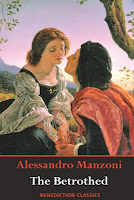Worthwhile Books
Books have to be heavy because the world's inside them. - Cornelia Funke
Friday, April 12, 2024
Stories as a Source of Truth - quote from Russ Ramsey
Thursday, March 28, 2024
In This Mountain by Jan Karon (Mitford #7)

Thursday, March 14, 2024
The Betrothed by Alessandro Manzoni

Thursday, February 29, 2024
What I Read and Watched in February 2024

Friday, February 23, 2024
He Goes Before Them by Meredith Helsby
I am a huge fan of P.O.W. memoirs, so when my sister told me about this book, I knew I had to get my hands on it.
Meredith and Christine Helsby arrived as missionaries to China in 1941. The attack on Pearl Harbor on December 7th brought an abrupt end to their language
study classes and marked the beginning of fifteen months of house arrest. Later
they were transferred to the “Weihsien Civilian Assembly Center” in Shantung Province
with their two-year old daughter, Sandra. Because they were civilians being
guarded by civilians, they did not receive the brutal treatment so famously
recounted in other P.O.W. memoirs. (Japanese soldiers reportedly had only disdain
for Allied soldiers who were “cowardly” enough to surrender and treated them
accordingly.) Though the Helsby’s captors were often gruff and unfair, the prisoners’
greatest depravations came from lack of good food and medical care.
At times the story is told from Meredith’s viewpoint and sometimes from
Christine’s. They write winsomely of how the Lord brought them through many trials.
He Goes Before Them was fascinating to me on various levels. First,
because the Helsbys were able to maintain a vibrant faith in the midst of
tremendous adversity. Second, because they were imprisoned with Eric Liddell of “Chariots
of Fire” fame. Christine writes of Liddell's godly influence on the young people in the camp and of the tragedy of his death (caused by a brain tumor) in Februrary of 1945:
Funerals in the Weihsien prison camp were common enough during those
dreadful days, but there was no funeral like Eric’s. The wave of sorrow which
swept over Weihsien was unbelievable. His was by far the biggest funeral held
in the two and a half years of our stay in the camp. Impressive was the fact that not
only the missionary community attended his funeral, but many others whose lives
he so powerfully impacted. Among them were the usually cynical business people,
city government administrators, and even prostitutes. His unassuming
naturalness had given him rapport with everyone he met.
The final reason I enjoyed it was because after the war, the Helsbys
served in Taiwan and were good friends of my parents. Growing up I always thought
of them as a sweet missionary couple, little dreaming of the tremendous
suffering they had experienced.

Friday, February 9, 2024
Worthwhile Movie #21 - BBC's North and South
Based on
Elizabeth Gaskell’s 1854 novel, North and South tells the story of how Reverend Richard
Hale moves his family from the (traditional) south of England to the (industrial)
north after he loses his curacy due to “matters of conscience.” Living at
reduced means with a sickly wife, Mr. Hale tutors young pupils and even gives
lessons in Latin to John Thornton, overseer of a large cotton mill.
One of the main story lines is how Hale’s genteel daughter, Margaret, adapts to this new reality. Members of Milton's upper class are suspicious of her father’s mysterious departure from the ministry and do not welcome her into their circle. She reaches out to several factory workers, but they misunderstand her overtures of friendship. It is delightful to watch her grow as she stumbles along (yet persists) in building relationships under these difficult circumstances.
A secondary
story, but a no less crucial one, is about the dynamics of power. Are all the
factory owners villains who care only for money and not a bit for the laborers? Do the workers have a right to strike for better wages? In our present-day understanding (relying heavily on a “critical theory mood”), there are only two
categories: the oppressed and the oppressor. No “master” can ever be right. And the oppressed can never be wrong. I was stunned by the deft, nuanced handling of
these subjects in this film. It would have not been made in the same way today.
Third, is
the love story, which, though central to the narrative, was understated, simmering
just below the surface for the most part. I love a story of unrequited love
(don’t ask me why!) so the fact that it took four hours for the romantic misunderstandings
to be resolved was fine by me. I also appreciated that the lead characters were
not over the top good-looking. He was a little too hawk-nosed and she a little
too plump by Hollywood standards, yet they were perfection in their respective roles.
I am not sure where this can be streamed (maybe Brit Box?), but we found it on DVD and were so glad to have discovered it. Now I may have to go back and re-read the novel!

Friday, January 26, 2024
The Christmas Pig by J.K. Rowling








